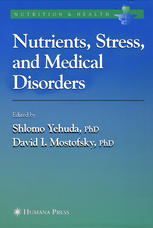

Most ebook files are in PDF format, so you can easily read them using various software such as Foxit Reader or directly on the Google Chrome browser.
Some ebook files are released by publishers in other formats such as .awz, .mobi, .epub, .fb2, etc. You may need to install specific software to read these formats on mobile/PC, such as Calibre.
Please read the tutorial at this link: https://ebookbell.com/faq
We offer FREE conversion to the popular formats you request; however, this may take some time. Therefore, right after payment, please email us, and we will try to provide the service as quickly as possible.
For some exceptional file formats or broken links (if any), please refrain from opening any disputes. Instead, email us first, and we will try to assist within a maximum of 6 hours.
EbookBell Team

4.4
82 reviewsAlthough it has long been recognized that what we eat and how we deal with stress play a major role in disease prevention and treatment, it is only recently that the scientific basis of this relationship has been aggressively studied. In Nutrients, Stress, and Medical Disorders, prominent researchers from academia, industry, and medicine survey current clinical findings on the complex interactions between diet, mental health, and stress, and their impact on disease states. The authors consider specific nutrients (fatty acids, glucocorticoids, herbal products, and alcohol), the effects of food, and stress, taking into account even environmental influences other than diet and their effects on stress and central nervous system functions. They give special attention to the influence of stress on physical health, mental health, and cognitive function, including the critical effects of maternal nutritional status and stress levels on fetal physical and mental development, the role of lipids in the development and treatment of depression, the role of fish oil in the development of aggressive behaviors, and the consequences of obesity on stress and the development of eating disorders. Additional chapters examine the effects of stress on chronic disorders, women, and cardiac function, and the influence of inflammation on diet, neurological functions, disease incidence, and cognitive functions.
Authoritative and up-to-date, Nutrients, Stress, and Medical Disorders offers health professionals in many areas of research and practice not only an easy-to-understand benchmark review of the importance of nutrition in reducing stress-related chronic diseases and optimizing health, but also insight into exciting possibilities for drug development, the design of therapeutic programs, and future research opportunities.